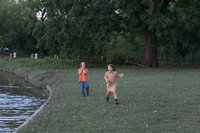Saturday, September 30, 2006
check out this article
A parent emailed me this article.
The article mentions A. Lillard's work through UVA (check out her book Montessori: The Science Behind the Genius.) These kind of articles give me hope that having research based information that supports what educators and parents have been saying all along will make a difference.
Wednesday, September 06, 2006
Nature Deficit Disorder?


My children enjoyed scaring away all the ducks at Bryan Park! :)
I found a topic for the day!
At the NAMTA (North American Montessori Teacher Association) Conference in Atlanta last January, the keynote speaker, Richard Louv addressed what he coined as a "Nature Deficit Disorder."
Here's a quote from Louv on the Nature Deficit Disorder:
"It's the cumulative effect of withdrawing nature from children's experiences, but not just individual children. Families too can show the symptoms -- increased feelings of stress, trouble paying attention, feelings of not being rooted in the world. So can communities, so can whole cities. Really, what I'm talking about is a disorder of society -- and children are victimized by it."
I've been slowing reading Louv's book Last Child in the Woods for a few months now. He raises some interesting points about how our society is limiting the interaction between children and nature. He points out the litigation issues that often deprive children of nature. For one thing, our parks and play spaces for children have much more to do with limiting liability for injury than anything else. Here's another interview quote:
"For instance, I bring up the idea of the "criminalization" of natural play, where if you take all the state regulations, the well-intended and often needed environmental restrictions, and add those to the covenants and restrictions that now cover almost any new development that has been built in the last 20 years -- things that control everything to whether you can plant rosebushes in the front to what color your curtains -- well, the idea of a freewheeling, tree-house-building, nature-loving kid doesn't fit that. So if all of [these restrictions] were to be enforced, playing outdoors by kids would be essentially illegal. It's not all enforced, but the message still gets through -- kids get a sense that there's something unsavory about playing outdoors. And it's too easy to blame this on lazy parents who let the TV do the baby sitting, when the truth is there is a matrix of forces that have come together to create this problem, and those forces are hard to stand up against as an individual and as a people."
It's a bold statement that Louv makes-- that the symptoms of ADHD would be reduced in children if we put them back in the woods, back outdoors in a natural environment. So far there is evidence to support the claims that stress reduction, increased creativity, cognitive skills, and full use of the senses are the immediate benefits of being in nature. I share with many adults the same feeling of relief to be outdoors.
(One of my goals this year is to make it a regular part of my life to go hiking and camping with my family. )
So here's the question I think parents need to ask themselves: is it worth the risk of poison ivy, ticks or other common (and mostly avoidable) hazards to put children back in the woods? If the benefits are increased creativity, concentration, and to reduce stress, are these "less controlled" environments worth it?
It was this issue that inspired me to offer a nature themed camp over the summer. We definitely immersed ourselves more with nature. Campers found lizards, a toad, many insects, a bird's nest with eggs and a hatchling bird, wild blackberries, the farmer's fields of tomatoes, corn, sunflowers, etc. and collected apples and fresh food and flowers from nearby fields. We took nature walks almost every day and spent an hour outside if we could. We watered the garden and pulled weeds all summer. It was a taste of nature, but not quite on the level as the author's childhood memories of unstructured play, fort building, and tree climbing
The only bad part about this book so far-- no one needs another label or issue to obsess about! In our modern tendency to frantically overschedule, is this just one more thing to stress over? I hope not. I hope it is a term that gives us permission to:
- take vacations
- go wild places
- relax
- play in the mud; get dirty, REALLY DIRTY with your child.
- have more fun outdoors!
Warmly,
Sarah
Are there any famous or successful people who were Montessori educated?
Many familiar people, who were Montessori educated, are listed below:
Peter Drucker, Management Guru
Larry Page, Co-Founder of Google
Sergey Brin, Co-Founder of Google
Jeffrey Bezos, Founder of Amazon.com
Katharine Graham, Owner/Editor of the Washington Post "The Montessori method—learning by doing— once again became my stock intrade..." from Personal History by Katharine Graham
Jacqueline Bouvier Kennedy Onassis, Editor, Former First Lady
Sean 'P.Diddy' (formerly known as Puffy) Combs, RAP mega-star
Anne Frank, Author of The Diary of Anne Frank
Gabriel Garcia Marquez, Nobel Prize winner for Literature Prince
William and Prince Harry, English royal family
T. Berry Brazelton, Pediatrician and Author J
ulia Child, Chef, Star of many TV Cooking Shows, and Author
Friedensreich Hundertwasser, Austrian painter and Architect
Many famous people chose Montessori schools for their own children including the following: Stephen J. Cannell, TV Writer-Producer-Director
Patty Duke Austin, Actress
Cher Bono, Singer and Actress
John Bradshaw, Psychologist and Author
Yul Brynner, Actor Marcy Carcy, TV producer
Bill and Hillary Clinton, Former President and New York Senator
Michael Douglas, Actor
Shari Lewis, Puppeteer
Yo Yo Ma, Cellist
Jennifer Granholm and Daniel Mulhern, Governor of Michigan
Other famous people connected to Montessori include:
Alexander Graham Bell (inventor) and his wife Mabel founded the MontessoriEducation Association in 1913. They also provided financial support directly to Dr. Maria Montessori and helped establish the first Montessori class in Canada and one of the first in the United States. Mister Rogers, children's TV personality, was a strong supporter ofMontessori education. Thomas Edison, scientist and inventor, helped found a Montessori school.
President Wilson's daughter trained as a Montessori teacher. There was aMontessori classroom in the basement of the White House during Wilson'spresidency.
Alice Waters, restaurateur and writer, is a former Montessori teacher.
Bruno Bettelheim, noted psychologist/author, was married to a Montessori teacher.
Erik Erikson, noted anthropologist/author, had a Montessori teaching certificate.
Jean Piaget, noted Swiss psychologist, made his first observations of children in a Montessori school. He was also head of the Swiss MontessoriSociety for many years.
-Ruth Liliana Tizon Caminante del Cielo Cosmico Rojo Kin/Sello 13 -
Welcome Back!

The new animals in the classroom are a real attraction. The parakeets are definitely still a little nervous around people. The newts and toad seem happy in their tank. There is actually a fish in there too, but it hides under the rock until I put out fish flakes. Getting the newts to eat is a challenge. The darkest brown newt does not seem to be eating at all. I've even bought some bloodworms (yeargh!) Looks like I've got some newt research ahead of me.
The classroom looks fantastic. I have Ms. Colleen to thank for the pretty windows and the inspiration! I love our new rug.
Here is one of the Stanford Jones songs we sing in the beginning of the year:
At the beginning is a good place to be
What will each day bring for you and me
New life new hope new things to do
At the beginning is a good place to be!
Saturday, September 02, 2006
a few more summer memories


My children went to Horseback Riding Camp this year at Level Green. Yvonne, one of the moms at the school, is an instructor there and her parents own Level Green.
It really is a beautiful place and the horses seem so happy! For our May Faire last year, Yvonne brought ponies from Level Green for pony rides.
So here is Rowan, a very improved rider, in my not-so-humble opinion, after one week of camp. He rides Tina, a sweet mare that sometimes just won't go! Anyway, a big thanks to Level Green for both my children's wonderful camp week and my own wonderful planning week while they were there! :)
more at oxford; stained glass
 Just a few more photos here of my trip to Oxford at Christchurch College. What an amazing place. I fell in love with all the stained glass in the cathedral there. The one above is my very favorite piece of all the stained glass we saw in England.
Just a few more photos here of my trip to Oxford at Christchurch College. What an amazing place. I fell in love with all the stained glass in the cathedral there. The one above is my very favorite piece of all the stained glass we saw in England. It was fun to do these dramatic poses here. My children recognized these hallways from the Harry Potter films.

The best part of traveling is getting inspired for life. It gets you back in touch with the essential part of yourself that mundane life can sometimes supress. Well, that's it for now!
Some pictures of my trip to England
Friday, September 01, 2006
A Blog For Me?
Actually, I love to journal. That part of my Montessori training, observing and journaling, was one of the easier things for me. In my own way though, I'm a private person. Like a turtle with a tough shell, I perfer to be able to hide my thoughts and feelings away. :)
I guess I'll see how this goes. I'm Sarah, and I teach at a little Montessori school in Richmond, VA.
I had a great day today training with Ms. Marcia and Ms. Tina. While the winds and rain shook the trees outside, we discussed the importance of grace and courtesy and control of movement. Maria Montessori waxes most eloquently on how the personality can express itself through refined movement. According to Maria, in order to organize your mind to learn, you must first learn to organize your body's movements.
I like how the grace and courtesy curriculum takes nothing for granted. Even the most basic routines, like blowing your nose or closing a door, are included as an important part of the child's acclimation to classroom life. We will practice social relations: how to get someone's attention, how to listen, how to take turns, how to apologize, etc. etc. Through these lessons, the foundation of respect is forged. Soon they will spontaneously create a community with each other. "I sliced a banana. Would you like a piece?" They will proudly offer a serving to a friend. "Yes, please. Thank you." "You are welcome." I am such a lucky person that I get to see these moments that make you believe that people are capable of living civilized and at peace!
St. Ignatius of Loyola once said, “Give me the first seven years, and I’ll give you the man.”
Here's my Montessori quote of the day:
“And so we discovered that education is not something which the teacher does, but that it is a natural process which develops spontaneously in the human being. It is not acquired by listening to words, but in virtue of experiences in which the child acts on his environment. The teacher's task is not to talk, but to prepare and arrange a series of motives for cultural activity in a special environment made for the child.”Dr. Maria Montessori: The Absorbent Mind
I look forward to meeting all these little people on Tuesday!



